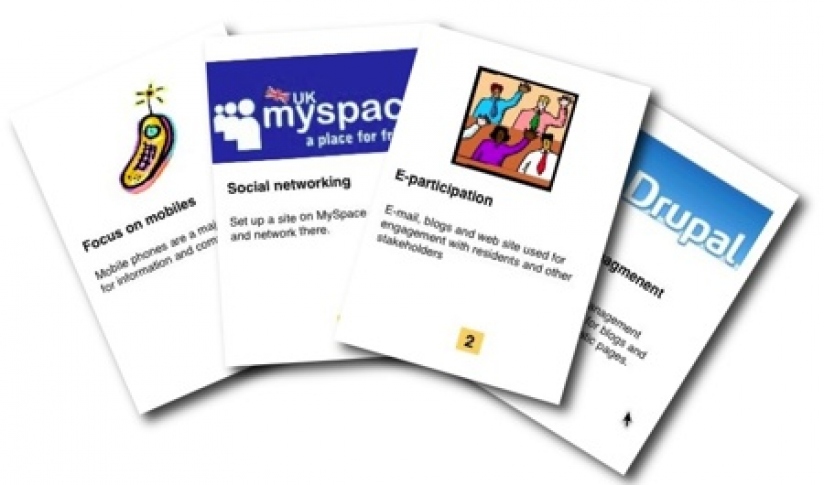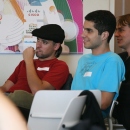Content Assessment Systems
Contributors: Ismael Peña-López
The idea is comparing the traditional academic system of double blind peer review with other systems emerging on the Information Society to assess content in online communities, like the ones used in Wikipedia, Slashdot or Digg. But without using computers: everything off-line, analogue.
A project within the framework of the Bank of Common Knowledge, the idea is to help communities — online or offline, whatever — to evaluate their incoming content in order to assess its suitability for their purposes. To do so, we created a workshop were the rudiments of several systems (three, so far) were explained, compared and practiced in simulations of situations where such content had to be evaluated... Read more
P2P versus Web 2.0 - Network Economics: The Game
Contributors: Telekommunisten
CONCEPT / GOAL / OBJECTIVES
When we use our computers and digital networks to send information it seems to go instantaneously from the sender to the receiver, so frequently we do not think about the path it takes, or the political and economic implications of this path.
From the late seventies to the early nineties networked communications for most people meant being a paying customer of an "online service" - the most prominent of these was CompuServe. Using such a service meant that CompuServe, a private company, had full control of your communication - including who you could communicate... Read more
Collective Moderation
Contributors: MetaReciclagem, Felipe Fonseca
Collaborators: Leo Germani, Elenara Iabel, Marcelo Braz, Wanderlynne Selva, MetaReciclagem.org mailing list.
The world wide web has been proposed in the early nineties as a free space, through which anyone could have access to a wide diversity of human knowledge. Later on, the web has also been identified as a brave new world in which every person would have the opportunity to interact with virtually any other and share his/her own knowledge, adding to the creation of a "collective intelligence", which would contain all sorts of useful (and also useless) information. If in one hand that has led to real disruptive technologies allowing new voices to be expressed throughout the world, on the other hand the huge amount of information available in any single moment exceeded what a person could be... Read more
The Social Media Game
Contributors: Designing for Civil Society, David Wilcox
By Beth Kanter and David Wilcox (Designing for Civil Society)
Note: An improved version ot the came can be found at http://socialbysocial.net
The Social Media Game was played for the first time at the UK National Circuit Rider ConFerence January 2007 following a presentation by Beth Kanter and David Wilcox.
When further developed, we hope that the game will be useful to those with roles (*) such as circuit riders, technology stewards, social reporters, buzz directors in helping individuals, groups, organisations and networks plan how to use social media.
The purpose of this first simple version is to trigger conversations about what social media tools may be appropriate in different situations, and further explore the issues raised in the presentation by... Read more
Co-Authoring Exercise
Contributors: Yuwei Lin, Enrico Zini
a) Concept, practise, tool in which it is inspired upon
A lot of creative work nowadays are done collectively, spontaneously and synchronously. The growth of Wikipedia shows that wiki can be used to create and share useful knowledge through co-authoring. However, how to collaborate, compromise different epistemologies is a challenge. This game is designed to instruct participants to find their common interests and common ground in making a story.
b) Goals
• identifying common interests and common ground
• learn to put different understandings down into one story: collective story-writing
• learn how to choose which group to work with
• learn how to keep participants interested in working with the group
• promoting diversity and pluralism: This game will promote a greater understanding of why diversity is vital in the current organisational context by working together to create a good piece of story,... Read more


 IMAGE
IMAGE IMAGE
IMAGE